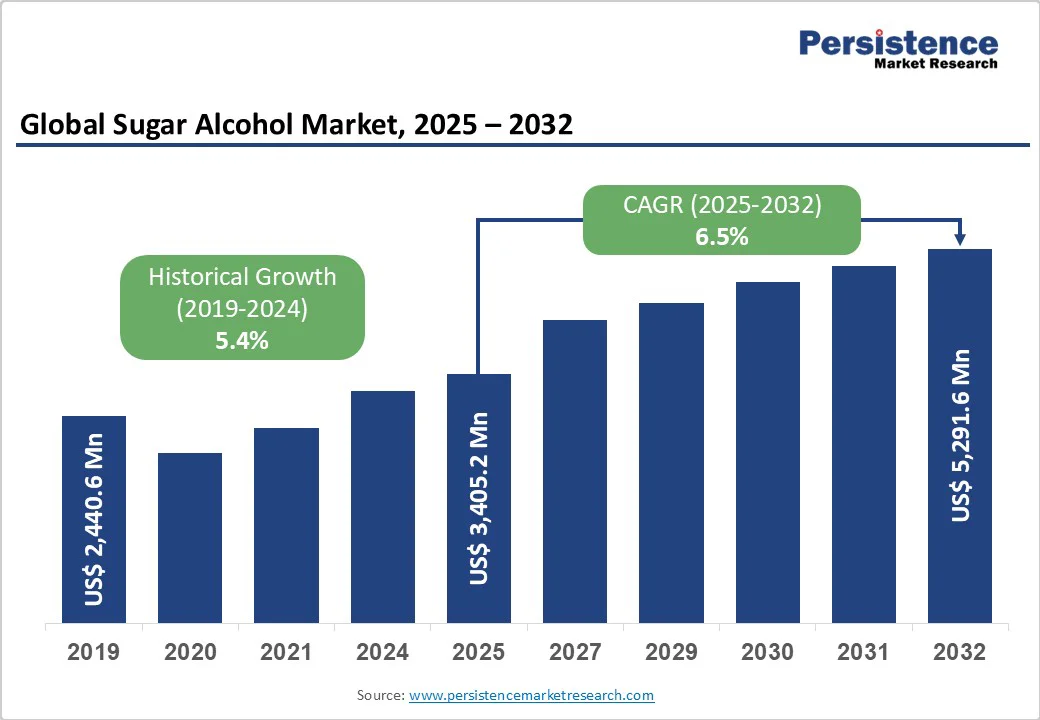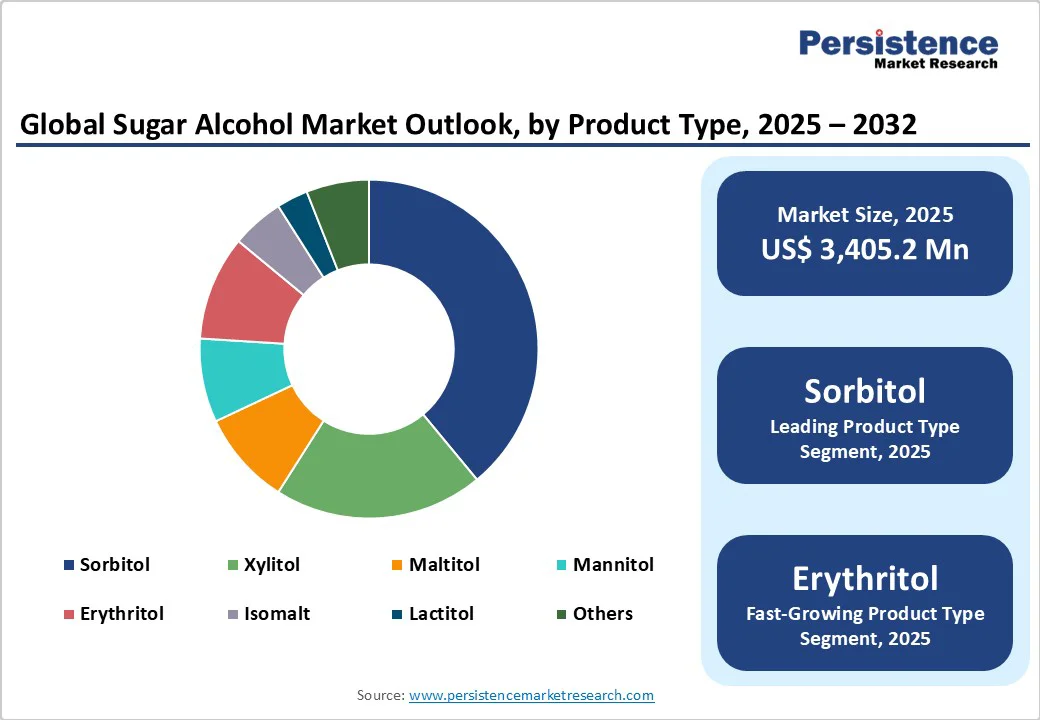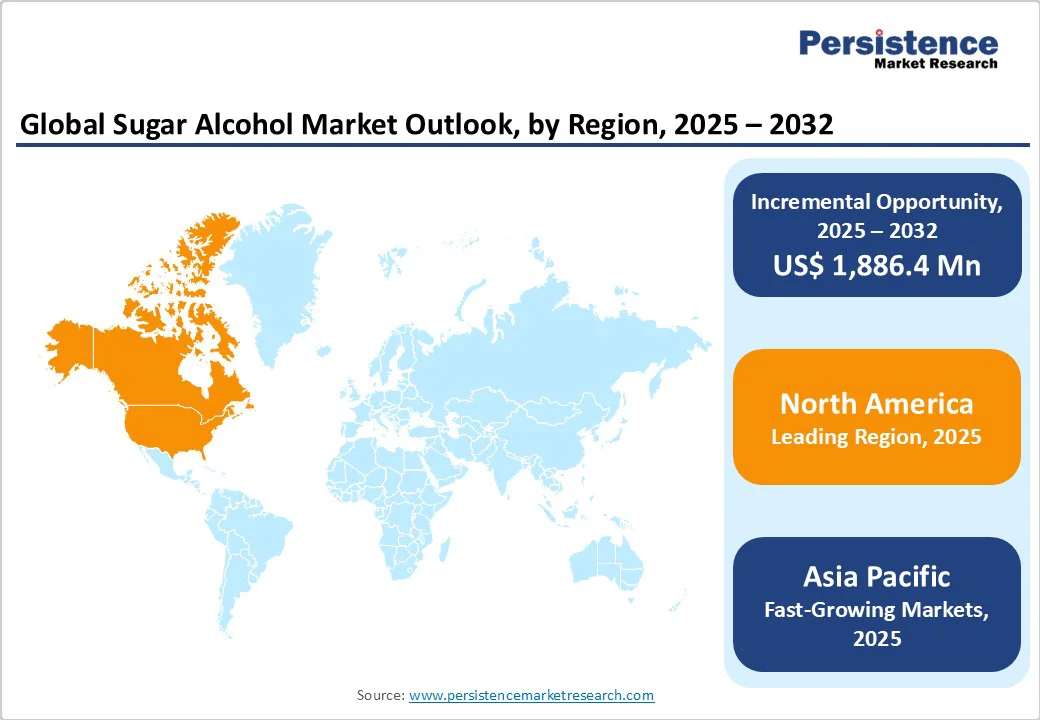ID: PMRREP3285| 196 Pages | 28 Oct 2025 | Format: PDF, Excel, PPT* | Food and Beverages

The global sugar alcohol market size is likely to value at US$ 3,405.2 million in 2025 and is projected to reach US$ 5,291.6 million by 2032 growing at a CAGR of 6.5% during the forecast period from 2025 to 2032.
| Key Insights | Details |
|---|---|
|
Global Sugar Alcohol Market Size (2025E) |
US$ 3,405.2 Mn |
|
Market Value Forecast (2032F) |
US$ 5,291.6 Mn |
|
Projected Growth (CAGR 2025 to 2032) |
5.4% |
|
Historical Market Growth (CAGR 2019 to 2024) |
6.5% |

Unlike traditional sweeteners that contribute to tooth decay, sugar alcohols such as xylitol, sorbitol, and erythritol actively support oral health, carving out a unique non-sweetness advantage in the global market. These compounds inhibit the growth of Streptococcus mutans, the primary bacteria responsible for cavities, while helping maintain saliva flow that neutralizes acids in the mouth. Dental associations worldwide endorse xylitol-based gums and candies for their cavity-preventive benefits, driving consumer confidence in oral-care-focused confectionery. The dental health angle gives sugar alcohols an edge in functional foods, toothpaste, and sugar-free chewing gums. As oral hygiene awareness grows across demographics, particularly among parents and health-conscious adults, sugar alcohols gain relevance as scientifically backed ingredients offering sweetness without compromising dental well-being or safety.
Cross-border trade of sugar alcohols faces growing challenges due to tariff inconsistencies and divergent regional purity standards. Exporters and importers must navigate varying duties, import taxes, and labeling regulations, which increase operational costs and complicate supply chain planning. Different countries impose specific purity thresholds, testing requirements, and documentation protocols for sugar alcohols such as xylitol, sorbitol, and erythritol, making standardization difficult. These disparities slow product approvals, limit market entry for smaller producers, and create uncertainty for manufacturers seeking global expansion.
Even as sugar alcohols gain traction for oral health and functional food applications, inconsistent trade regulations hinder seamless international distribution, prompting companies to invest in compliance teams, regional partnerships, and localized production to mitigate risk and maintain competitive positioning in a fragmented global market.
The rising popularity of low-carb and ketogenic diets presents a strategic opportunity for sugar alcohol manufacturers to offer custom erythritol–maltitol solutions tailored to brand-specific needs. Health-conscious consumers increasingly seek sugar-free, reduced-calorie alternatives in chocolates, baked goods, beverages, and snack bars, creating demand for blends that balance sweetness, mouthfeel, and digestive tolerance.
Companies can collaborate with low-carb brands to formulate optimized ratios of erythritol and maltitol that replicate sugar’s functional properties while minimizing aftertaste or laxative effects. Innovative offerings such as powdered blends, syrups, or pre-mixed inclusions for industrial use can enhance convenience and product performance. By aligning with dietary trends and providing turnkey solutions, sugar alcohol producers can strengthen brand partnerships, capture niche segments, and expand presence in the fast-growing low-carb functional foods market.
Sorbitol holds approximately 36% market share as of 2024, making it the leading sugar alcohol in the global market due to its versatile applications across confectionery, baked goods, pharmaceuticals, and personal care products. Its high sweetness, humectant properties, and ability to maintain texture and moisture make it ideal for sugar-free formulations. Xylitol is valued for its pronounced dental benefits and cooling effect, commonly used in chewing gums, toothpaste, and mints, appealing to oral-health-conscious consumers. Maltitol offers a near-sugar taste profile with lower caloric content, making it suitable for chocolates, candies, and baked goods where sensory similarity to sugar is crucial. Together, these sugar alcohols provide manufacturers with functional flexibility, helping meet diverse dietary preferences while maintaining product quality and consumer appeal.
Personal & oral care segment is projected to achieve a positive CAGR during the forecast period, driven by increasing consumer awareness of oral hygiene and the demand for natural, non-cariogenic ingredients in personal care formulations. Sugar alcohols such as xylitol, sorbitol, and erythritol are widely incorporated into toothpaste, mouthwashes, chewing gums, and sugar-free candies to prevent cavities, maintain saliva flow, and provide a refreshing taste. Rising preference for clean-label and functional personal care products is encouraging manufacturers to formulate innovative solutions that combine oral health benefits with skin-friendly and moisturizing properties. As preventive healthcare and wellness trends expand globally, sugar alcohols are becoming a preferred ingredient for effective, safe, and consumer-trusted personal and oral care products.

North America holds approximately a 35% share in the Sugar Alcohol Market, driven by increasing consumer preference for low-calorie, functional, and oral-health-promoting sweeteners. In the U.S., xylitol and erythritol are increasingly incorporated into sugar-free gums, candies, and baked goods, supported by dental associations endorsing cavity-preventive benefits. Rising adoption of ketogenic, low-carb, and diabetic-friendly diets is boosting demand for maltitol- and erythritol-based formulations. Clean-label and natural sweeteners are gaining traction, prompting manufacturers to highlight non-GMO and plant-based sourcing. In Canada, growing awareness of oral health and sugar reduction is encouraging the use of sugar alcohols across functional foods, confectionery, and personal care products. Retail expansion, e-commerce platforms, and innovation in flavored and blended sugar alcohol offerings are further shaping the North American market trajectory.
Asia Pacific sugar alcohol market is expected to grow positively fueled by rising health awareness and increasing demand for low-calorie, functional sweeteners across China, Japan, and India. In China, sugar alcohols such as xylitol and erythritol are gaining popularity in sugar-free confectionery and beverages, driven by growing urban health-conscious consumers. Japan shows strong adoption in oral care products, including toothpaste, chewing gums, and lozenges, reflecting consumer focus on dental wellness. In India, the rising prevalence of diabetes and increased interest in low-sugar diets are promoting maltitol- and sorbitol-based products. Expanding e-commerce platforms, clean-label preferences, and innovative flavored sugar alcohol blends are further enhancing accessibility and consumption across the Asia Pacific region.

The global sugar alcohol market is highly dynamic, with established companies and agile startups competing through product innovation, quality, and functional differentiation. Leading players focus on expanding production capacities, developing custom sugar alcohol blends, and enhancing supply chain efficiencies to meet rising demand from confectionery, beverages, and personal care industries.
Startups are driving niche innovations by creating flavored erythritol, maltitol combinations, and clean-label, low-calorie sweeteners targeting health-conscious and diabetic consumers. Companies are increasingly emphasizing natural sourcing, non-GMO ingredients, and sustainable production practices to strengthen brand credibility. Strategic partnerships with food manufacturers and e-commerce platforms are expanding market reach, while R&D efforts in taste masking, granulation, and solubility optimization are enabling diverse applications. Competitive branding and digital marketing further reinforce consumer engagement and loyalty in the evolving sugar alcohol landscape.
The global sugar alcohol market is projected to be valued at US$ 3,405.2 Mn in 2025.
The key factor driving the global sugar alcohol market is its ability to support dental health, offering a distinct benefit beyond simple non-sweetness.
The global sugar alcohol market is poised to witness a CAGR of 6.5% between 2025 and 2032.
Targeting low-carb brands for custom erythritol–maltitol solutions is the key market opportunity.
Major players in the Global Sugar Alcohol market include Cargill, Incorporated, Roquette Frères, ADM, Ingredion Incorporated, Tereos, Tate & Lyle PLC, and others.
| Report Attribute | Details |
|---|---|
|
Historical Data/Actuals |
2019 - 2024 |
|
Forecast Period |
2025 - 2032 |
|
Market Analysis |
Value: US$ Mn, Volume: Tons |
|
Geographical Coverage |
|
|
Segmental Coverage |
|
|
Competitive Analysis |
|
|
Report Highlights |
|
By Product Type
By Application
By Distribution Channel
By Region
Delivery Timelines
For more information on this report and its delivery timelines please get in touch with our sales team.
About Author